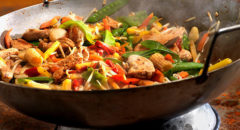
If you’re one of the millions of Black people who are living with acid reflux, then you know how important it is to eat well. Unfortunately, you don’t always know which foods to avoid until it’s too late. That’s where this list comes in. It’s a lot easier to avoid discomfort when you have a clear picture of what foods are safe and which ones should never make it on your plate.
Why What You Eat Matters
Acid reflux or gastroesophageal reflux disease (GERD) is characterized by the backflow of stomach acid into the esophagus. When this happens, it can cause pain and discomfort.
While the causes of acid reflux can vary, it can be attributed to a weakened lower esophageal sphincter. This sphincter usually prevents the backflow of stomach acid and food so a damaged one wouldn’t be able to do the same job.
By eating the right foods, you can control how much stomach acid your body produces. It’s not a cure but it can certainly keep the symptoms on a manageable level.
READ: 9 Natural Remedies To Get Rid Of Acid Reflux And Heartburn…Fast!
The Best Foods When You Have Acid Reflux
The right foods for someone with acid reflux are usually filling without affecting the stomach’s acidity or production of acid. These are some of the options:
- Ginger
- Whole grains – oatmeal, brown rice
- Green, leafy vegetables – spinach, broccoli, asparagus, green beans, kale
- Root vegetables – sweet potatoes, carrots, beets, radishes
- Other vegetables – celery, cucumber, lettuce
- Non-citrus fruits – papayas, bananas, watermelon, apples, pears
- Egg whites
- Healthy fats – avocados, walnuts, flaxseed, olive oil, sesame oil, sunflower oil
- Lean meats – chicken, turkey
- Seafood
- Fermented foods – kimchi, sauerkraut
- Broth
- Lentils
- Almond butter
The Worst Foods When You Have Acid Reflux
The foods on this list are notorious for triggering acid reflux flare-ups because of how they affect the digestive system. These are some of the foods you need to avoid.
- Greasy, fried foods – fried chicken, French fries
- Full-fat dairy products including cheese
- Chocolate
- Carbonated drinks
- Pizza
- Highly processed foods – potato chips
- Spicy foods
- Chili and cayenne pepper
- Fatty meats – bacon, sausages
- Tomatoes and tomato-based sauces like salsa
- Citrus fruits – oranges, grapefruit, lemons, limes
- Peppermint
- Coffee
- High-fat cuts of red meat
- Alcohol
- Jams and jellies
- Whole eggs
- Peanut butter
- Refined sugar
- Ice cream
- High-fat sour cream
- High-fat creamy dressings, dips, or sauces
- Pineapples
- Garlic
- Onions
READ: 6 Ways to Help Manage Acid Reflux
Of course, some of these foods can be lurking in meals that you assume to be safe so never shy away from asking about the ingredients that are in what you’re about to eat.
Apart from sticking to this list, doctors recommend that you keep a food diary so you can write down how your body reacts to new or certain foods. Doing that makes it easy for you to see if things are changing over time.
While watching what you eat will be helpful, that doesn’t mean you should ignore your doctor’s prescribed medical regimen. It’s easier to control your acid reflux by combining the two.
It’s also best to consult your doctor if there are any concerns about changing your diet or how your body might react to certain foods.









